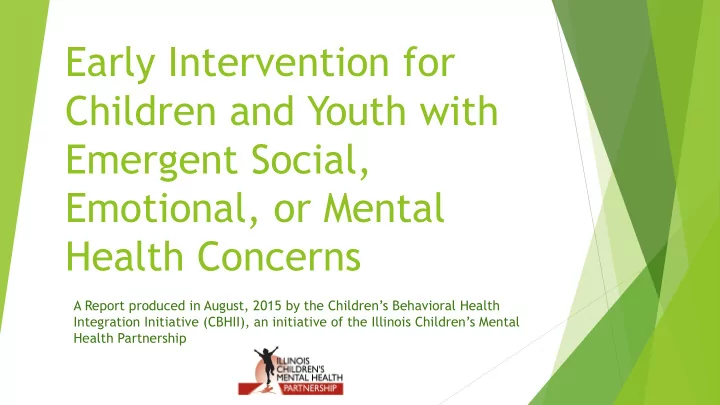

Early Intervention for Children and Youth with Emergent Social, Emotional, or Mental Health Concerns A Report produced in August, 2015 by the Children’s Behavioral Health Integration Initiative (CBHII), an initiative of the Illinois Children’s Mental Health Partnership
IL Children’s Mental Health Act of 2003 Established the Illinois Children’s Mental Health Partnership (ICMHP). Mandated that ICMHP develop a comprehensive children’s mental health state plan. Allowed office of mental health funds to be used for children 0-18. Expanded pre-psych hospital screening program. (saved IL approximately $19 mil per year)
IL Children’s Mental Health Act of 2003 Improved methods of capturing Medicaid funds that can be used to support children’s mental health. Required Illinois State Board of Education to develop social/emotional learning standards. Required local school districts to develop policies on social/emotional development.
ICMHP State Plan Six key areas Prevention, Early Intervention, and Treatment Public Education and Awareness Financial Investments Building Qualified and Trained Workforce Shared Accountability among Key State Agencies Invest in Research 28 priority recommendations Short-term strategies and action steps
Investments in ICMHP Plan FY 05 – FY 15 State Appropriations $ 52.07 million DHS/DMH $ 36.78 ISBE 15.29 State Agencies 1.41 DCFS .25 IVPA 1.16 Foundations/Othe r .232 TOTAL $ 54.056 million
ICMHP Funded Initiatives School /SEL Initiatives $15.290 million Early Intervention Services 7.225 Family Leadership 5.702 JJ Trauma Services 3.360 Transitions Project 3.250 Evidence-Informed Initiative 3.050
ICMHP Funded Initiatives ICMHP Staff/Summits/Trainings $ 2.951 million Consultation Project 2.475 Tele-Psychiatry 2.000 Services for 0-5 1.850 DocAssist (cmh consult line) 1.600 Public Awareness Campaign 1.465 EI for Children of Incarcerated 1.375 Parents
ICMHP ADVOCACY ISSUES Adding infant/childhood mental health provision to Mental Health Reform bill in Congress Amending IL School Code to require social and emotional screen as part of required school physical Reforming IL Juvenile Justice system and creation of Youth Diversion Task Force Creation of Advisory Council on At-Risk Students within IL State Board of Education Codifying Teen Reach Grant Program
Children’s Behavioral Health Integration Initiative Organized to promote integration of various state mental health planning efforts Comprised of representatives from: IL Children’s Mental Health Partnership IL Department of Human Services, Division of Mental Health IL Department of Children & Family Services IL Human Services Commission Association of Community Mental Health Authorities of Illinois Initially produced Crosswalk of Planning Efforts and Treatment Service Recommendations and Descriptors
What is Early Intervention in Social, Emotional, Mental Health Context? Services provided to address social, emotional, behavioral or mental health concerns identified at the earliest ages and earliest stages as they appear; Concerns can occur from birth into adulthood; Services may be targeted to individuals or a population subgroup at higher risk for developing social, emotional, behavioral or mental health problems
Why Early Intervention is Important Early intervention services have been demonstrated to : Prevent, delay and/or reduce the severity of social, emotional, behavioral or mental health problems later in life; Promote positive health outcomes, change a young person’s developmental trajectory, and improve quality of life for children, families and communities; Result in substantial cost savings for families and systems, including educational, welfare and juvenile justice systems.
Examples of At-Risk Groups Children/youth exposed to violence in the home or community Children/youth with parents who have mental illness or substance abuse problems Children/youth who are homeless or at-risk of homelessness; Children/youth with incarcerated parents; Children separated from parents by child welfare system Children/youth who suffer(ed) from other adverse childhood experiences
Components of Effective Statewide Early Intervention System Early identification, voluntary screening, assessment, referral and follow-up Perinatal depression screening and services Key interventions that are coordinated, adequate and statewide Mental health consultation with providers Trauma-informed practice Provider capacity building and training
Examples of Evidence-Informed Early Interventions Parent Education and Support Services Voluntary home visits EI Part C school readiness services Short-term counseling and support groups for children/youth that include skill-building
Examples of Evidence-Informed Early Interventions Crisis Supports Student Support Services Mental health consultation for providers across child/youth serving systems Trauma-informed practice
Recommendations for Implementation of Early Intervention Strategies in Illinois Create awareness among stakeholders of the importance of early intervention efforts. Build provider capacity to offer early intervention services. Build on, expand, and coordinate across existing systems, such as EPSDT , home visiting, consultation, school-based and after-school programs, managed care, etc. Conduct community demonstration project to demonstrate the process and impact of early intervention
WEBSITE WWW.ICMHP.ORG (Media Center: ICMHP Publications)
Recommend
More recommend